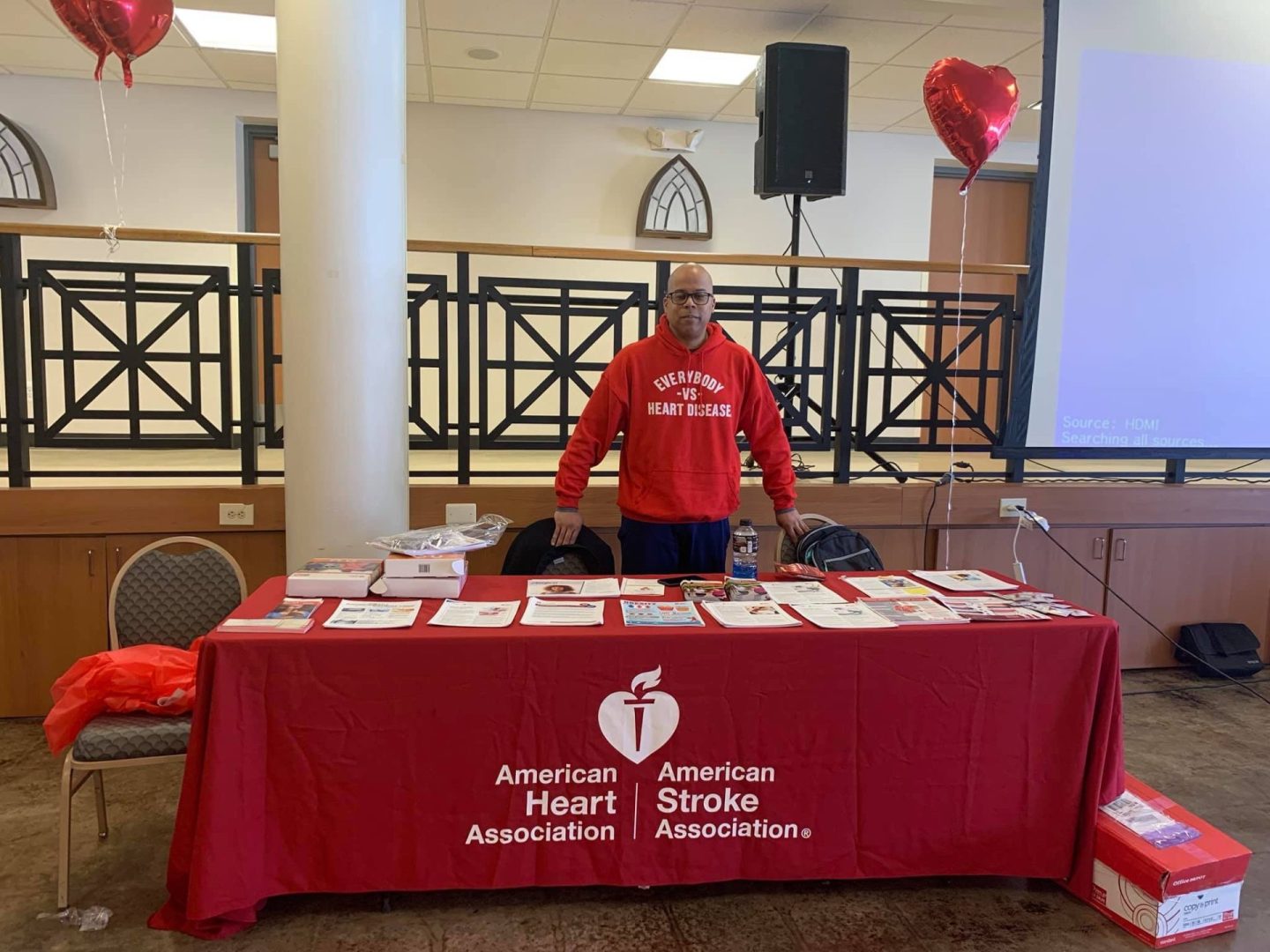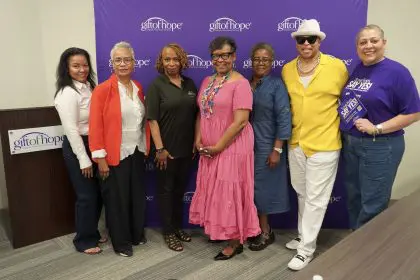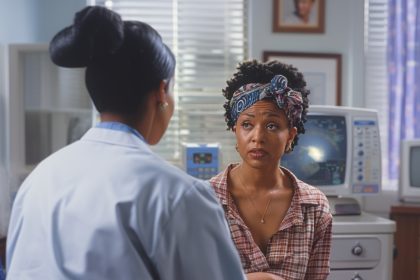Fourteen years ago, James Young faced a life-altering diagnosis: congestive heart failure and cardiomyopathy. His prognosis was grim, and he encountered three separate heart failure diagnoses, but through sheer resilience and determination, he beat the odds. Remarkably, James never required surgical intervention, such as a defibrillator implantation, but the journey was far from easy. His fight for survival opened his eyes to the lack of awareness and resources available to others facing similar health battles, particularly in underserved communities.
This profound experience led James to dedicate his life to advocating for cardiovascular health. In 2015, he connected with the American Heart Association (AHA) and quickly became a National Heart Failure Ambassador and Patient Advocate. He has since shared his story on national platforms and at local health events, inspiring others to take heart health seriously.
Driven by his personal mission, James decided to pursue a formal education in public health, completing his bachelor’s degree at Eastern Michigan University in 2021 and earning his Master of Public Health from Purdue University in December 2023. Now, he is a clinical researcher and retention coordinator at Wayne State University, contributing to critical hypertension research aimed at African Americans in the Detroit metropolitan area. Through his work, James continues to fight for equity in healthcare, ensuring that others receive the care and knowledge they need to lead healthier lives.
James’ story is one of survival, purpose, and advocacy, and as part of the Leaders of Impact campaign, he is seeking support to help fund cardiovascular research and promote heart health equity in underserved communities.
The following conversation with James Young offers insights into his journey and mission.
Your personal journey with heart failure and cardiomyopathy has been remarkable. Can you share how that experience motivated you to pursue a career in public health and become a community health advocate?
“Living with congestive heart failure and cardiomyopathy 14 years ago profoundly shaped my life. The challenges I faced, from diagnosis to treatment, opened my eyes to the critical need for advocacy and education about cardiovascular disease, especially within underserved communities. I realized that so many people—people like me—were unaware of the signs and symptoms or had limited access to quality healthcare. Being one of the lucky ones that came out of three heart failure diagnoses without needing any surgical procedures, I gained a new lease on life and purpose. That’s when I connected with the Michigan AHA office in 2015 and began sharing my story at local health events and with heart patients in hospital centers.
Since 2017, I’ve served on multiple research grant review committees through the AHA, and that motivated me to pursue a career in public health. I wanted to advocate for others and work to dismantle the systemic barriers that lead to health disparities. My journey isn’t just about survival; it’s about ensuring others have the knowledge and resources to prevent or manage these conditions.”
You’ve been involved with the American Heart Association for nearly a decade. What has been the most rewarding aspect of your work as a National Heart Failure Ambassador and Patient Advocate?
“The most rewarding aspect of my work has been connecting with other heart failure patients and their families. Sharing my story and hearing theirs creates a powerful bond, reminding all of us that we’re not alone in this fight. Whether it’s through community outreach, national events, or media appearances, I’ve been able to use my voice to inspire hope and action. The ability to affect real change—whether encouraging someone to seek medical help earlier or helping families understand the importance of heart health—has been incredibly fulfilling.”
Your story has been featured in many prominent media outlets. How do you leverage your platform to inspire others to take heart health seriously, especially within underserved communities?
“Media exposure has been a valuable tool in amplifying my message, but it’s not just about being seen or heard. It’s about using that platform to share meaningful, relatable stories that resonate with people who might feel disconnected from traditional healthcare messaging. I focus on culturally competent communication, meeting people where they are, and breaking down complex health information into accessible, actionable steps. I’ve been fortunate to share my story through outlets such as Fox News Detroit, Ebony Magazine, AARP, and Blackdoctor.org, and I always emphasize the disproportionate impact of cardiovascular disease on underserved communities. My goal is to bridge that gap in awareness.”
What has been your most impactful contribution to cardiovascular disease advocacy, and how do you plan to continue making a difference in the field?
“Since 2017, I’ve had the privilege of serving on the AHA’s Strategically Focused Research Network (SFRN) committees, where I’ve helped determine how AHA funds are allocated to various research institutions. It’s been incredibly rewarding to play a role in advancing cardiovascular research, especially when that research can help save lives and reduce health disparities. Being part of this decision-making process has given me a deep appreciation for the complexity of cardiovascular research, and I’m excited to continue supporting the AHA’s mission to build healthier lives free of heart disease and stroke.”
As someone who ignored classic heart failure symptoms, what advice do you give others about recognizing the early warning signs and seeking medical help in time?
“My biggest piece of advice is to listen to your body. Symptoms like shortness of breath, persistent fatigue, and swelling are often brushed off as stress or aging, but they could be signs of something much more serious. I ignored my own symptoms for too long, and it nearly cost me my life. Early detection and intervention can make all the difference, so if something feels off, trust your instincts and see a healthcare professional. It’s better to get checked out and be safe than to miss a critical diagnosis.”
In your work with the AHA’s Strategically Focused Research Network and Wayne State University’s Hypertension Advisory Board, what key insights have you gained about improving heart health on a larger scale?
“One key insight is the importance of addressing both clinical and social determinants of health. We can’t just focus on medical treatment without considering factors like access to healthy food, safe environments for exercise, or economic stability. Sustainable improvements in heart health require a comprehensive approach that includes community partnerships, culturally tailored interventions, and a commitment to health equity.”
If you are named the National Leaders of Impact Winner, how would you use this platform to further your mission of raising awareness about heart disease and improving community health?
“Winning the National Leaders of Impact title would provide a powerful platform to expand my advocacy work and raise awareness about heart disease, particularly within communities of color. I would use this opportunity to amplify the voices of heart failure patients, promote early intervention, and continue pushing for healthcare systems that prioritize equity. Ultimately, I want to empower people to take control of their heart health and advocate for themselves within the healthcare system.”
To support James Young’s Leaders of Impact campaign, visit here.














